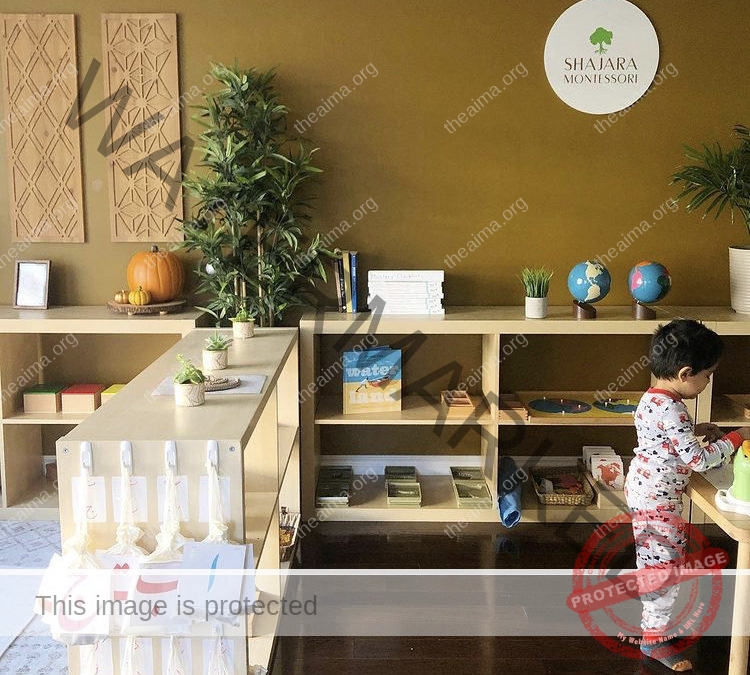By: Fatema Rehmani and Ulaa Kuziez
During her undergraduate years, Montessori Educator Nadia Husain studied Communications, and initially had no intention of becoming a teacher. She eventually realized that being a teacher interested her far more than Communications, so she made the switch to education. After receiving her Bachelor’s in Education, Husain worked as an elementary school teacher for eight years.
“But even still, while working as a teacher, I always felt that there was something missing,” Husain said. “I found that all the teachers in the public school system had such different ideas on what works and what doesn’t, and it just didn’t sit well with me. I found that I had to constantly yell to get my students’ attention; and it was very difficult for me to develop a philosophy that I could follow in terms of behavior management, as well as curriculum.”
While Husain was on maternity leave four years ago, she discovered Montessori through a YouTube Channel called Hapa Family, and realized she wanted to implement this philosophy at home, with her three-year-old son, Raja.
“[The YouTube Channel] would show us things that we can do in our own home. And I was like, ‘This is amazing. I love the simplicity of it. I love how it’s something that makes sense to me.’”
This finding sparked her Montessori journey and the creation of Husain’s blog, Shajara Montessori, where she showcases the projects and activities that she does with Raja. In May of 2021, she received her formal Montessori certification through the North American Montessori Center (NAMC).
“All the gaps that [I felt] were missing were being filled in with Montessori. [Likewise], the things that were missing in the Islamic school system could so easily be filled through Montessori philosophy, in a very complementary way and without sacrificing Islamic values,” Husain said.
Given her teaching background and the passion that Husain feels for Montessori, she has decided to incorporate Montessori values into the way she raises, and homeschools, her son.
“I basically just follow him throughout the morning with whatever he’s interested in. He’ll help me with breakfast, depending on what we’re having. We have our own little kitchen setup, so he’ll get his things and lay them out on the table. We have a Learning Tower, which is amazing. I would highly recommend anyone to get that [because] it can really enable your child to be involved.”
As both a mother and a teacher, Husain has taken an interest in the parallels of Montessori and Islamic philosophy. In her blog, she compares a prepared Montessori environment to that of a garden. For example, she views providing children with support and resources as planting the seeds for their success; however, Husain also recognizes that we do not rush and interrupt the growing of plants, but instead leave them to the will of Allah (SWT). With raising a child, Husain suggests that children also experience this freedom within limits.
“There’s that hidden realm of not knowing what your child is going to be like. A child is not like another object or creature that you can have so much control over. It is a human being. Just as we desire autonomy in our lives, small children desire the same thing. They may not be able to communicate it as effectively, but it is something that is our responsibility to give them,” Husain said.
Currently, Husain is in school for her masters in Second Language Education. At home, she is teaching her son both English and Urdu.
“From a cultural perspective, I would say being bilingual is very important because as a child grows, they will be asking questions about who their grandparents are and where they came from. It is important to provide them with opportunities to access their culture. When you’re not allowed to speak your language, you lose ties with your elders, and you lose ties with your culture,” Husain said. “I have experienced this firsthand, in that my father is actually a poet. There’s so much wisdom in what he is saying, but I don’t understand it. A language is not just a language; it is a connection to your identity as a whole. So it’s very important for me to build that [for Raja] at a young age, when he has that absorbent mind.”
Husain understands that Montessori education is commonly applied when children are most adept at learning and are in their most crucial period of development. Yet through her research, she also finds that Montessori values transcend far beyond younger years.
“Dr. Maria Montessori emphasized the teachings of grace and courtesy at this age, and there is huge emphasis on this in Islamic philosophy. Building a foundation of sound character is key to opening the heart to incline towards Islam as children grow,” Husain said. “The best way to instill this is through modelling with our own actions and words. While it may take some ‘unlearning’ of how we were raised, prioritizing our own character development will inevitably make an impact on our children’s understanding of how to be respectful and kind individuals. It truly is a holistic philosophy of education that requires the teacher to be a prepared and invested adult.”
If you are interested to be featured in The IME Report, please send you an inquiry to info@theaima.org.
Copyright © 2021 American Islamic Montessori Association, all rights reserved.

